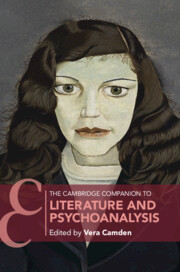Book contents
- The Cambridge Companion to Literature and Psychoanalysis
- The Cambridge Companion to Literature and Psychoanalysis
- Copyright page
- Contents
- Figures
- Abbreviations
- Contributors
- Acknowledgments
- Chronology
- Introduction Reading to Recover
- Part I In History
- 1 Varieties of Psychoanalytic Experience
- 2 Recognitions
- 3 Rivalry and the Favorite Child in Jane Austen’s Pride and Prejudice and Persuasion
- 4 Encountering Invisible Presence
- 5 Dislocating the Reader
- Part II In Society
- Part III In Sight
- Part IV In Theory
- Further Reading
- Index
5 - Dislocating the Reader
Slave Motherhood and The Disrupted Temporality of Trauma in Toni Morrison’s Beloved
from Part I - In History
Published online by Cambridge University Press: 16 December 2021
- The Cambridge Companion to Literature and Psychoanalysis
- The Cambridge Companion to Literature and Psychoanalysis
- Copyright page
- Contents
- Figures
- Abbreviations
- Contributors
- Acknowledgments
- Chronology
- Introduction Reading to Recover
- Part I In History
- 1 Varieties of Psychoanalytic Experience
- 2 Recognitions
- 3 Rivalry and the Favorite Child in Jane Austen’s Pride and Prejudice and Persuasion
- 4 Encountering Invisible Presence
- 5 Dislocating the Reader
- Part II In Society
- Part III In Sight
- Part IV In Theory
- Further Reading
- Index
Summary
In “Dislocating the Reader,” I use psychoanalytic theory to think about how the language of Toni Morrison’s Beloved works on readers. Placing the text of Beloved into dialogue with Jean Laplanche’s theory of the belated time of trauma enables me to think through the ethical and emotional effects of Beloved’s delayed narrative structure on readers. Visual images from the past lives of the characters intrude into the narrative, without explanation; in confusing the reader, these intrusions convey the distortions of time, thought, and memory that disturb these survivors of slavery’s traumas. The chapter centers on the main character, Sethe. I read the mothering practices of Sethe and of her own slave mother through the lens of historical research on actual slave mothers, who were torn between the demands of the master for their labor and the needs of their babies for their time. Throughout, the chapter attends to the difficulties of writing Beloved, as Morrison herself explained them in interviews: to capture the psychic damages inflicted by slavery on her ex-slave characters Morrison had to invent a new narrative language.
Keywords
- Type
- Chapter
- Information
- The Cambridge Companion to Literature and Psychoanalysis , pp. 90 - 106Publisher: Cambridge University PressPrint publication year: 2021

